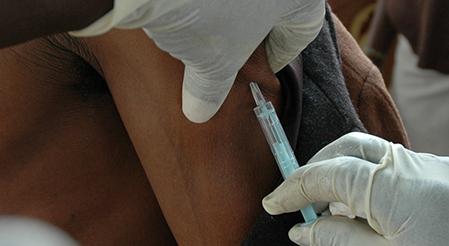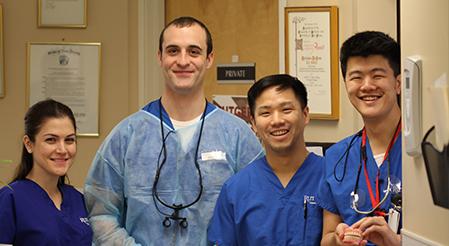UNIVERSITYWIDE
Rutgers Global Health Institute
Rutgers is distinguished in its many efforts to advance health and wellness, and its broad reach, diversity, and expertise provides opportunities to address a wide array of health challenges. As one of the outcomes of the university’s strategic planning, the recently established Rutgers Global Health Institute helps to coordinate and catalyze work across Rutgers schools and campuses. The institute serves as a mechanism for focusing global health research, education, outreach, and leadership, and will foster collaboration among faculty from various disciplines. By partnering with communities and organizations beyond Rutgers, the institute aims to improve the health and wellness of populations, locally, and around the world.
Richard Marlink
Director
Rutgers Global Health Institute
Richard G. Marlink, a Harvard professor recognized internationally for research and leadership in the fight against AIDS, joined Rutgers as the inaugural Henry Rutgers Professor of Global Health and director of a new Global Health Institute at Rutgers Biomedical and Health Sciences (RBHS) in July 2016. At the start of the AIDS epidemic, Marlink was instrumental in setting up the first HIV/AIDS clinic in Boston and studied the impact of the HIV virus in west and central Africa. After helping to start the Botswana-Harvard Partnership in 1996, he founded the Kitso AIDS Training Program, which would become Botswana’s national AIDS training program. Marlink was the principal investigator for the Tshepo Study, the first large-scale antiretroviral treatment study in Botswana, in addition to conducting other clinical and epidemiological studies in the region. In the mid-1980s in Senegal, Marlink was part of the team of Senegalese, French, and American researchers who discovered and then studied the second type of human AIDS virus, HIV-2. Since then, he has been involved in multiple HIV/AIDS care, treatment, and prevention programs in many African countries, including in Botswana, Côte d'Ivoire, Democratic Republic of the Congo, Kenya, Lesotho, Malawi, Mozambique, Rwanda, Senegal, South Africa, Swaziland, Tanzania, Uganda, Zambia, and Zimbabwe. He has also organized initiatives to enhance HIV/AIDS care in Brazil, Puerto Rico, and Thailand.
RUTGERS–CAMDEN
Susan Norris
Assistant Professor
Rutgers School of Nursing–Camden
Susan Norris leads a two-week service-learning abroad course to Brazil. Students work with an NGO, Amizade, and healthcare professionals to provide healthcare, promote community initiatives, and engage with local children.
Marian Nowak
Assistant Professor
Rutgers School of Nursing–Camden
Marian Nowak and colleague Patricia Sayers were appointed as United Nations delegates by the International Catholic Committee of Nurses and Medio-Social Assistants (CICIAMS) in 2015. As UN delegates, Nowak and Sayers participated in numerous conferences and workshops centered on global health care, and served as advisers in the development of various projects to help address the United Nations’ eight Millennium Development Goals for 2015.
Marie O’Toole
Senior Associate Dean
Rutgers School of Nursing–Camden
Marie O’Toole contributes to a number of global health projects and student opportunities, including service-learning experiences in South America and Europe that examine health systems and help improve air quality.
Patricia Sayers
Assistant Professor
Rutgers School of Nursing–Camden
Patricia Sayers and colleague Marian Nowak were appointed as United Nations delegates by the International Catholic Committee of Nurses and Medio-Social Assistants (CICIAMS) in 2015. As UN delegates, Nowak and Sayers participated in numerous conferences and workshops centered on global health care, and served as advisers in the development of various projects to help address the United Nations’ eight Millennium Development Goals for 2015.
Jeanann Sousou
Assistant Professor
Rutgers School of Nursing–Camden
Jeanann Sousou is the faculty leader for a service-learning abroad course that immerses students in Bolivian culture and society. Students participate in school programs teaching children proper teeth brushing habits and home plastering projects to seal in mosquitoes that live in walls. Students are required to research the UN Sustainable Development Goals as part of this course.
RUTGERS–NEWARK
Mark Gluck
Professor, Center for Molecular and Behavioral Science
Rutgers–Newark College of Arts and Sciences
For more than 25 years, Mark Gluck has been unlocking the doors of the hippocampus to gain a better understanding of how it interacts with different parts of the brain to support learning and memory. His international research helps to provide new insights into memory, learning, and behavioral disorders associated with Alzheimer's, Parkinson's, epilepsy and other forms of brain injury.
RUTGERS–NEW BRUNSWICK
Francis Barchi
Assistant Professor
Bloustein School of Public Policy and Planning
Francis Barchi’s work focuses on ethical issues in global health as well as the individual, household, and community factors that influence women’s and girls' health in southern Africa. Her research interests in Africa include violence against women and children, women’s autonomy and decision-making relating to health care and research, and ethical issues involving the collection, use, and storage of biological samples.
Daniel Hoffman
Associate Professor, Department of Nutritional Sciences
School of Environmental and Biological Sciences
Daniel Hoffman’s research can be broadly termed "international nutrition,” and he studies factors that influence nutrition and health in developing countries. These two areas of research, one being primarily clinical and physiological and the other being epidemiological and economic; these areas are complementary as the physiological outcomes studied only become manifest when the economic conditions of a country improve.
Mukund Karwe
Dean, International Programs
School of Environmental and Biological Sciences
In addition to his role as dean of international programs, Mukund Karwe is professor of food engineering with research interests in food extrusion, microwave and hybrid baking, fortification of foods with omega-3 fatty acids, high pressure food processing, effects of processing on nutraceuticals in foods, cold plasma processing, and mathematical modeling of flow of food in human GI tract. Among his many research projects, Karwe and partners in India to make healthy snack products from quinoa; another project focused on extracting healthy products from the peels of a starchy fruit called pinao, which is found in Brazil.
Matthew Matsaganis
Associate Professor
School of Communications and Information
Matthew Matsaganis’ research focuses specifically on how communication—considered as a set of foundational social processes through which people, organizations, institutions, and communities organize and make sense of their activities—mediates the impact of place on individuals’ lives. He is primarily interested in local effects on individuals’ physical and mental health and well-being, but also in how place impacts self-identity and civic engagement. In spring 2018, Matsaganis will be a Fulbright scholar in Athens, Greece, where he will investigate strategies employed by individuals and families in disadvantaged communities of Athens to weather the ongoing economic crisis and its health-related effects.
Joachim Messing
Director, Waksman Institute of Microbiology
Joachim Messing is a biologist recognized for work in genomics and biotechnology. Messing made his innovations freely available, ensuring rapid advances in all life sciences. With contributions to plant genomics, he focuses on raising the nutritional quality of food. In 2003, Messing, scholars from the Waksman Institute of Microbiology, and a consortium of partners received NSF funding to complete sequencing of the genetic structure of rice chromosome 10 that could improve a crop that provides food for the world. Messing is also well-known for a genetic engineering technique used in laboratories to create plants that have produced disease-resistant crops considered crucial to feeding the world’s population and drugs like erythropoietin (EPO) used to treat cancer patients.
RBHS
Javier Escobar
Professor of Psychiatry and Family Medicine
Associate Dean for Global Health
Robert Wood Johnson Medical School
Javier Escobar is dedicated to giving global health medical students an international experience to help them embrace global issues; he has facilitated student exchanges to Japan, India, Mexico, and many other nationswhere students gain exposure to ongoing clinical, academic, and research programs. He is also principal investigator of a $5 million collaborative NIH project that aims to identify genetic causes of a major psychiatric disorders such as schizophrenia by examining the paisa population in Colombia.
Karen Wei-Ru Lin
Professor, Department of Family Medicine and Community Health
Assistant Dean of Global Health
Robert Wood Johnson Medical School
Karen Lin is the faculty adviser for the HIPHOP-Promise Clinic, a medical students-run weekly health clinic for underserved populations in New Brunswick; as well as the faculty advisor for many cross-cultural medical students groups and courses, including the Medical Mandarin elective, Asian Pacific American Medical Student Association, International Health Interest Group, and Physicians for Human Rights. She has conducted a number of international research projects in global health, including improving influenza immunization rates in New Brunswick, improving newborn and maternal health in Tanzania, and creatively engaging food access and nutrition.
Michael K. Gusmano
Associate Professor
School of Public Health
Michael Gusmano led a study to examine whether Delhi’s increased investment in public health infrastructure is associated with a reduction in premature death from preventable causes.
Gregory Peck
Assistant Professor of Surgery
Associate Professor, Acute Care Surgery Fellowship
Associate Director, Trauma
Robert Wood Johnson Medical School
Surgery professor Gregory Peck also serves as director of the International Trauma Fellowship, Latin America for the Division of Acute Care Surgery at Rutgers Robert Wood Johnson Medical School. He has been instrumental in the development of an International Fellowship Rotation in Cali, Colombia, which serves as an invaluable operative experience for fellows in the Acute Care Surgery Fellowship program.
Ziad Sifri
Associate Professor, Department of Surgery, New Jersey Medical School
President, International Surgical Health Initiative
Ziad Sifri graduated from the McGill University Faculty of Medicine, Montreal, Canada, in 1995. In addition to serving as president of ISHI, he is also the director of the New Jersey Medical School’s Global Surgery fellowship, a one or two-year opportunity that includes clinical care and service, education, and research.
Suzanne Willard
Associate Dean of Global Health
School of Nursing
Suzanne Willard has been involved in the field of HIV for over 20 years. She has participated in NIH sponsored research studies and explored a variety of avenues to insure that women and their families receive the array of services that are required for healthy outcomes. She initiated a clinical program in an academic OB/GYN practice at Temple University Hospital providing HIV consultative services at the same time that the women received their OB care. This program has been replicated throughout the City of Philadelphia and has resulted in a dramatic decrease in perinatal transmission of HIV disease to children.
Initiatives

International Surgical Health Initiative
The International Surgical Health Initiative (ISHI) is a humanitarian nonprofit organization founded in 2009 and presided over by Ziad Sifri, an associate professor of surgery in the New Jersey Medical School. Sifri organizes and plans two to three surgical missions annually to deliver free surgical care to underserved communities internationally; these missions provide training opportunitites for Rutgers medical students and residents.

Rutgers Health
Rutgers Health is physicians and dentists, nurses and pharmacists, social workers and psychologists. It is clinics, doctors’ offices, and wellness centers across New Jersey. Beginning now and developing over the next several years, the university is creating a three-part structure that builds on decades of patient care delivered in our state.
